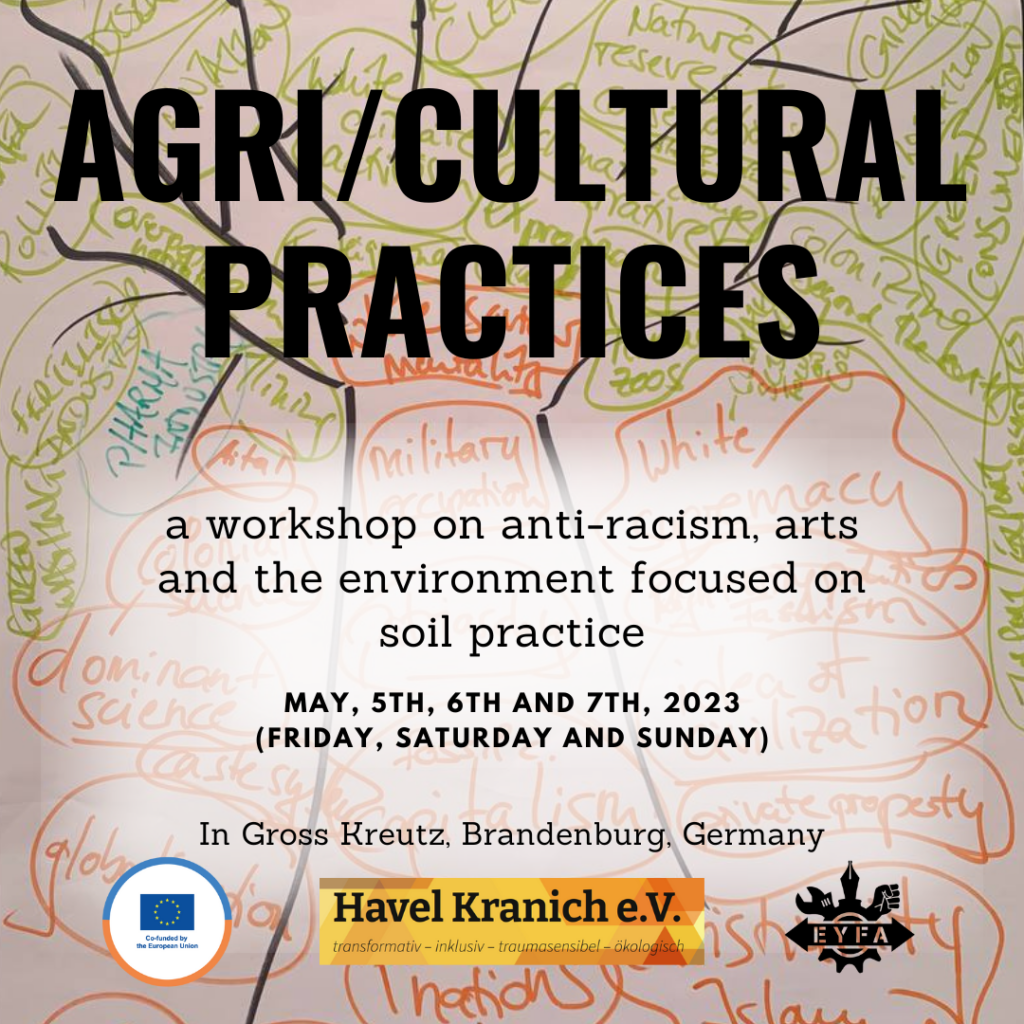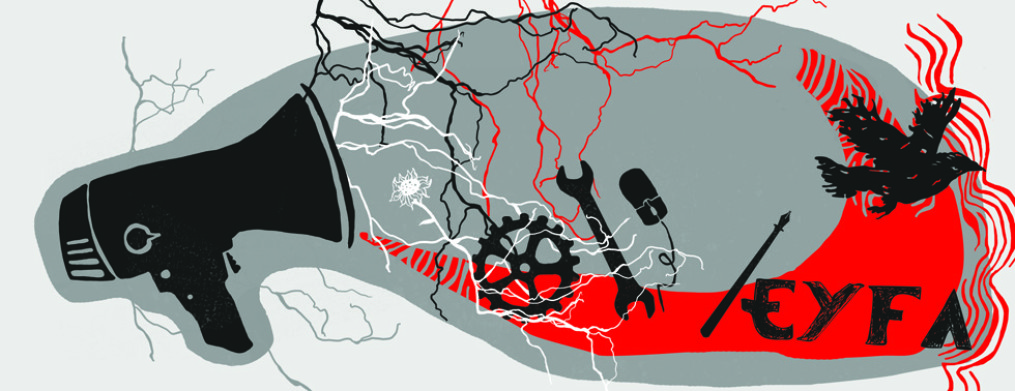Agri/cultural practices: a workshop on anti-racism, arts and the environment focused on soil practice is now open to new participants!!!

Are you interested in fighting racism and addressing climate injustice?
Would you like to explore how the arts, gardening and farming can work together?
Are you Black, Asian, Indigenous, a Person of Colour, from a migrant background or a white person committed to anti-racism? If so – read on!
What is the workshop about?
Agri/cultural practices is a practical experimental workshop that provides an introduction to Permaculture (permanent agriculture) sustainable design ethics and principles through games and exercises from Theatre of the Oppressed, aimed at rehearsing solutions for change. Both Permaculture and Theatre of the Oppressed are informed by Indigenous, Black and working-class knowledge and experience. This way of combining Permaculture and Theatre of the Oppressed was developed through the Neighbourhood Academy at Prinzessinnen Garden, Berlin in 2019.
However, this workshop goes further by not only providing an introduction but focusing on anti-racism, climate justice, decolonizing, addressing power structures, understanding the link between colonialism and environmental chaos, challenging environmental racism and exploring the potential of art. The site of the workshop is a garden in development, and we will explore possibilities to design the garden with questions of the workshop in mind.
What will we be doing?
We will be playing games, doing practical exercises, reading, creative writing, observing the landscape and designing, theatre games, discussing as well as enjoying the countryside, eating healthy food and relaxing in nature. The 2nd part of the workshop concentrates on building soil and grounds. Learning different practices of composting and feeding the soil will be next to in-depth and guided observation exercises, engaging in embodied theater games and a film screening, focusing on composting and decolonization.
Where and when will the workshop take place?
Schedule:
- Friday 5 May, arrival from 4pm is welcome. The workshop will be from 5pm-9pm (including mealtime)
- Saturday 6 May 9am-9pm (with breaks, meals and optional evening programme)
- Sunday 7 May 10am-4pm (with breaks and mealtime)
The workshop will take place in Gross Kreutz, Brandenburg, Germany at the site of myzelium project (myzeliumprojekt.wordpress.com/)
Trains from Berlin to Gross Kreutz take 40 minutes. A minibus will be provided from the station to the workshop. Driving to the venue and parking is possible. Arriving by bicycles through the Havelradweg is possible and beautiful.
Access:Unfortunately, the venue is currently not yet accessible to wheelchairs. However, do get in touch to discuss your access needs and we will try to facilitate participation. We will check in with the participants about needs to apply a Covid-19 safety policy.
How much will it cost?
The participation of the workshop is FREE for Black, Indigenous, PoC, refugees and non-white migrants. For others, we ask for a donation to the venue on sliding scale.
Vegan / vegetarian food will be provided by an on-site cook. Please let us know if you have any dietary restrictions. All participants are expected to share in tasks such as food preparation and cleaning up after meals.
For the food, we ask a contribution of 10-100 Euros for the whole weekend depending on your possibilities.
Accommodations in own tents is free. There are a few places on mattresses. Single or double rooms are available next door for 35/50 Euros per night.
Maximum number of participants: 16.
The majority of participants will be Black, Asian, Indigenous and or People-of- Colour. Part of the work will be in smaller groups and break out groups can be facilitated.
Language: English, with German translation if needed.
Childcare: Please let us know if you require childcare and we will try to support this.
Special guest facilitator:
Asmelash Dagne
Born and raised in Ethiopia, qualifications include: Diploma of Integrated Natural Science (Hawassa college of Education/Ethiopia), Bachelor of Natural Science (Arba Minch University/Ethiopia), Permaculture Design Diploma (At permaculture institute of Britain/England) and Master of Science in Environmental Resources Management at the Brandenburg University of Technology Cottbus – Senftenberg/Germany focus on utilizing renewable energy technology to ensure sustainable access tclean water, energy and food in most vulnerable areas of the developing countries. From 2008-2013: I started my career in 2008 as an integrated natural science teacher and school
“Permaculture” practitioner. In the years to come, I have received eight regional and national prizes for remarkable achievement in creating a modal education and innovation center for sustainable integrated natural resource management in Ethiopia. From 2014-2016: I worked as “Permaculture” trainer and consultant for SMART-Ethiopia (Sustainable Management of Alternative and Renewable Technologies). Trained over 2000 farmers, students, teachers, and agriculture extension workers in collaboration with various stakeholders (CISS – Ethiopia, LVIA – international, Slow Food International, and others). 2017 – 2018: I worked as assistant general manager at SMART – Ethiopia to install and manage seven solar water pumps to ensure sustainable access to water, energy, and food.
Trained farmers and extension work on integrated resource management. Since 2019 I have been Involved in planning and designing a multi years project on Agroforestry for sustainable development of human and nature in rural Ethiopia as external consultant, Environmental consultant and trainer @ EcoPhiRenewablesEngineeringGabH. See https://bestecodesign.wordpress.com/
Workshop concept
NicoleWolf
Nicole is a white queer German researcher, writer and Senior Lecturer in Visual Cultures (Goldsmiths, University of London) living in Berlin and London. Her background is in exploring political cinemas for their capacity to resist what is deemed to be real and to imagine otherwise. Much of her research and thinking is inspired and informed by artistic and activist practices in South Asia, including in military occupied Kashmir. Nicole started training in Permaculture in 2014 (at Ecodharma, facilitated by Alfred Decker and Caspar Brown), followed by two PC teacher trainings including Rosemary Morrow’s course in Srinagar, Kashmir. Since then she has been passionate about connecting her interest in critical ecologies, anti-colonial environmentalisms, permaculture and creative practice, exploring agriculture as resistance practice and what a cinematics of the soil might be. Collective learning and making processes which draw on diverse knowledges are crucial for all of these questions. Nicole’s participation in ‘Living Archive – Archive Work as a Contemporary Artistic Practice’ and ‘Archive ausser sich’ (both projects by Arsenal – Institute for Film and Video Art, Berlin) included research and writing for the restoration of film works by Yugantar, the first feminist film collective in India (1980-83) as well as the development of “Soil – City- Solidarity”, an interdisciplinary urban permaculture design course, and the symposium “’Tell me what matter was the ground’ –
Repair beyond redemption”. Publications can be found here: https://www.gold.ac.uk/visual-cultures/n-wolf/
Mojisola Adebayo
Mojisola is Black-British (Yoruba/Danish) queer playwright, performer, producer, facilitator, Lecturer at Queen Mary, University of London and research fellow at Potsdam University, working on environmental racism through theatre. Mojisola holds a BA in Drama and Theatre Arts, an MA in Physical Theatre, a PhD in black queer theatre (University of London). Mojisola trained extensively with Augusto Boal and is a specialist in Theatre of the Oppressed, working particularly in locations of conflict and crisis. She has worked in theatre, radio and television over the past 25 years across four continents, performing in over 50 productions, writing, devising and directing over 30 plays, from Antarctica to Zimbabwe. Her own plays are concerned with racism, climate change, slavery, occupation, homophobia, Islamaphobia, gender-based violence and the Black Lives Matter movement. Publications include her plays in Mojisola Adebayo: Plays One and Plays Two (Oberon Books), 48 Minutes for Palestine (Methuen), TheTheatre for Development Handbook (Pan, co-written with John Martin and Manisha Mehta), Wind / RushGeneration(s) (in National Theatre Connections 2020, Methuen) and Black British Queer Plays and Practitioners (Methuen, co-edited with Lynette Goddard. Mojisola is commissioned by Counterpoints Arts. For more see www.mojisolaadebayo.co.uk
Partners: This workshop is a collaboration with EYFA and is only made possible through
Counterpoints Artsand Havel Kranich.
For more see:
How do I apply and ask further questions?
Email: Timo (info@havel-kranich.org) today and let us know:
- A little about you, including how you identify (e.g. Black, Asian, Indigenous, Person of Colour, white, LGBTIQ+… this list is not exhaustive)
- Why you would like to do the workshop
- Any questions, requests or needs that you have
